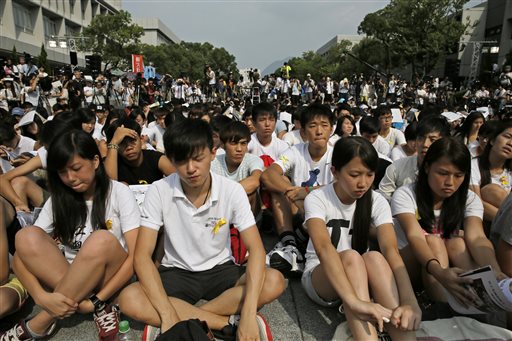
Students attend a rally at the Chinese University of Hong Kong campus in Hong Kong, Monday, Sept. 22, 2014. AP
HONG KONG — Thousands of Hong Kong college and university students boycotted classes Monday to protest Beijing’s decision to restrict electoral reforms, the start of a weeklong strike marking the latest phase in the battle for democracy in the southern Chinese city.
The strike comes as dozens of the city’s tycoons and business leaders visit Beijing to meet with China’s communist leaders, who are seeking to bolster support among Hong Kong’s pro-establishment billionaire elites for the central government’s policies on the semiautonomous city.
Student organizers are dismayed over Beijing’s decision in August to rule out open nominations for candidates under proposed guidelines for the first-ever elections to choose Hong Kong’s top leader, promised for 2017.
The National People’s Congress, China’s legislature, insists candidates be vetted by an elite committee similar to the body of mostly pro-Beijing elites that has until now selected the city’s leaders.
The battle over democracy in Hong Kong has led to an increasingly tense and divided city, with activists threatening to stage a mass “occupation” of the Asian financial hub’s central business district as early as Oct. 1 as part of a civil disobedience campaign to press their demands.
When China took control of the former British colony in 1997, it agreed to a mini-constitution that guarantees Hong Kong can keep civil liberties unseen on the mainland, while also promising that the leader can eventually be chosen through “universal suffrage.” But Beijing’s insistence that candidates be screened for patriotism to China has stoked fears among democracy groups that Hong Kong will never get genuine democracy.
“The student strike will mark the turning point of the democratic movement,” Alex Chow, secretary general of the Hong Kong Federation of Students, told the crowd rallying at the Chinese University of Hong Kong’s suburban campus. “We will not have illusions in the government anymore, but we’ll have faith in ourselves. We are willing to pay the price for democracy.”
Students plan to gather daily for the rest of the week in a downtown park next to government headquarters.
“Preselected candidates by a controlled nominating committee can only represent vested interests, but not the general public,” Chow said. He urged Hong Kong’s government to respond to demands for public nominations and to reform the legislature.
“If we hear nothing from them, the students, the people will definitely upgrade the movement to another level,” Chow said.
About 380 academics and other school staff have signed a petition supporting the students, saying they should not “stand alone.”
“At the minimum, they (the strikers) can provide a wakeup call to tens of thousands of university and secondary school students in Hong Kong,” said Dixon Sing, a political science professor at Hong Kong University of Science and Technology who helped start the signature campaign. The organizers are “trying to inspire many other fellow classmates to be aware of and be devoted to the democratic movement,” he said.
In Beijing, more than 60 Hong Kong tycoons, including Li Ka-shing, Asia’s richest person, were meeting with President Xi Jinping to discuss democratic reform. They urged democracy activists to avoid a confrontation, saying Beijing will not change its mind.
“Hong Kong is a financial center, and if the main financial district is messed up, then Hong Kong will be ruined,” billionaire property developer Lee Shau-kee told reporters after arriving in Beijing on Sunday night.